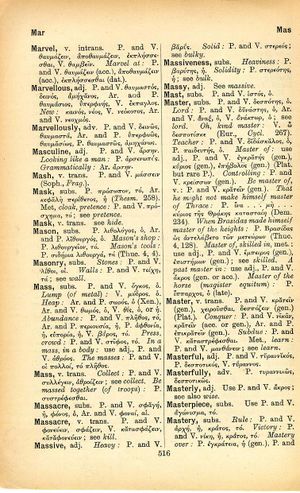mass
δυοῖν κακοῖν προκειμένοιν τὸ μὴ χεῖρον βέλτιστον → the lesser of two evils, the less bad thing of a pair of bad things, better the devil you know, better the devil you know than the devil you don't, better the devil you know than the devil you don't know, better the devil you know than the one you don't, better the devil you know than the one you don't know, the devil that you know is better than the devil that you don't know, the devil we know is better than the devil we don't, the devil we know is better than the devil we don't know, the devil you know is better than the devil you don't
English > Greek (Woodhouse)
substantive
lump (of metal): V. μύδρος, ὁ.
heap: Ar. and P. σωρός, ὁ (Xen.), Ar. and V. θωμός, ὁ, V. θίς, ὁ, or ἡ.
abundance: P. and V. πλῆθος, τό, Ar. and P. περιουσία, ἡ, P. ἀφθονία, ἡ, εὐπορία, ἡ, V. βάρος, τό.
press, crowd: P. and V. στῖφος, τό.
in a mass, in a body: use adj., P. and V. ἁθρόος.
the masses: P. and V. οἱ πολλοί, τό πλῆθος.
verb transitive
collect: P. and V. συλλέγειν, ἀθροίζειν; see collect.
be massed together (of troops): P. συστρέφεσθαι.

